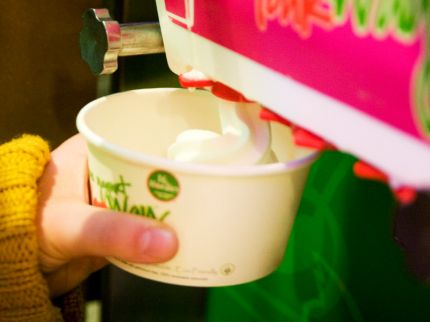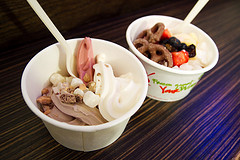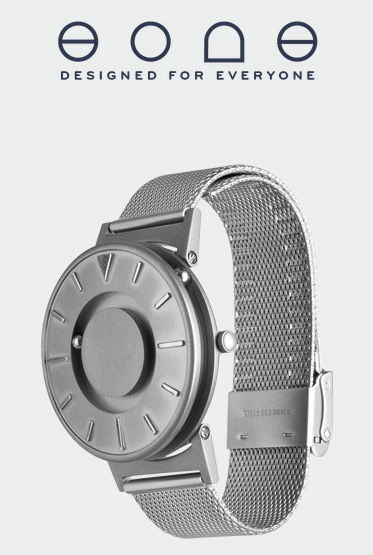
In a compelling setting organized by the Korean Trade Promotion Agency (KOTRA), two Korean startups recently shared their success stories of launching and expanding a brand in the US—from frozen yogurt to design award winning watches the stories of these companies provide plenty of learning potential for all aspiring entrepreneurs.
Korean showcase #1: 16 Handles
 The secret of making it in New York with a physical retail concept that can easily be duplicated? Perfect branding and taking a store to the most competitive location one can find. This was the formula behind the success of frozen yogurt chain 16 Handles.When founder Solomon Choi came from balmy Southern California to a chilly New York in winter of 2008, he neither knew the city nor had a real strategy in place for the expansion of his frozen yogurt store which he had launched in Los Angeles. What he did know: In order to build a global food franchise, he needed to prove that the concept would work in New York City.Knowing that with the cost of a lease in NYC and the cost of building out a store he only had one shot, he spent several weeks figuring out where his target group—females 18 to 34 years old—lived. After much research, which consisted mostly of walking the streets of the city and observing the different communities each neighborhood held, he decided that the East Village—with its proximity to NYU—was his best bet. His market research paid off. The then new frozen yogurt concept beat the competition with its sleek and modern design. With 16 different flavors to choose from, it was different in its quality and variety.
The secret of making it in New York with a physical retail concept that can easily be duplicated? Perfect branding and taking a store to the most competitive location one can find. This was the formula behind the success of frozen yogurt chain 16 Handles.When founder Solomon Choi came from balmy Southern California to a chilly New York in winter of 2008, he neither knew the city nor had a real strategy in place for the expansion of his frozen yogurt store which he had launched in Los Angeles. What he did know: In order to build a global food franchise, he needed to prove that the concept would work in New York City.Knowing that with the cost of a lease in NYC and the cost of building out a store he only had one shot, he spent several weeks figuring out where his target group—females 18 to 34 years old—lived. After much research, which consisted mostly of walking the streets of the city and observing the different communities each neighborhood held, he decided that the East Village—with its proximity to NYU—was his best bet. His market research paid off. The then new frozen yogurt concept beat the competition with its sleek and modern design. With 16 different flavors to choose from, it was different in its quality and variety.
16 Handles became a franchise and over 40 other East Coast locations were soon added. What made the city so attractive for Choi and his brand was the closeness to other businesses and the cross promotion opportunities. According to Choi an entire industry was watching what worked in New York and what didn’t. Competition in the frozen yogurt market has surged since he opened his first store in 2008, and now there are several frozen yogurt companies imitating his formula of self-serving. However, with New York showcasing the business it has worked even in a competitive landscape. 16 Handles recently announced a global expansion into the Middle East with 140 shops in several countries and an expansion of the menu into smoothies.
Korean Showcase #2: EONE
The secret of breaking into the US market with a new product? Ask the right questions (and listen to advice from your target group). A lot of New Yorkers share an instinctive curiosity and the willingness to learn something new every day. Korean-born entrepreneur Hyungsoo Kim of EONE was inspired by a simple question of a fellow student: “What time is it?” The question was asked day after day by someone who simply could not read the time—a blind fellow student who was sitting next to him in class. When researching the availability of watches for the visually impaired he soon discovered that there were very few options. As a student of MIT in Boston he immediately grabbed the opportunity (and a couple of his fellow students) and started developing a watch using the braille system.He might have saved a couple of months of hard work by asking a question first: What would you like a watch to be like if you were blind? After having developed a Braille-based prototype he found out that the community did not like his design and that less than ten percent of all visually impaired even used braille. A new design was needed, and this time he got it right. He replaced the hands of a watch with rotating balls, which the community immediately liked. The next problem: No investor trusted his gut feeling and wanted to risk a bet in an overly saturated watch market. Fortunately for EONE, there were new ways to raise money, and Kickstarter came to his rescue. Within weeks, Hyongsoo was able to raise $600,000 USD and—even more importantly—he won his first clients and free marketing money. The expansion of the brand and creation of new lines such as alarm clocks for the blind are next, but his curiosity and willingness to search for the right answers were setting the stage for his current success as an entrepreneur.It helps to have good designers and a compelling story to tell. The first watch has won an award by the prestigious London Design Museum and as an inspiration the team shot a movie with Bradley Snyder who was blinded by an IED explosion while serving in the navy in Afghanistan. Instead of resignation, Bradley started training with the desire to compete in the 2012 summer Paralympics in London—and he ended up winning. Bradley later became the spokesperson of EONE and helping the visually impaired has become a mission for the company.Two outstanding Korean entrepreneurs and their success stories in the US—would these stories have been possible in Korea? Maybe. When asked about their experience building out their businesses in the US the two entrepreneurs agreed that the US, and New York in particular, have helped them realize their dreams, by telling compelling stories and fine-tuning their concepts.KOTRA, with its North American head office in Midtown Manhattan, helps bring Korean businesses to the US. With thousands of Koreans living and working in the Tri-state area alone, Korean / US trade relations are of growing importance for the community and for everyone interested in South Korea as an international trade partner and potential business investment. KOTRA regularly organizes events on branding and IP rights, helping their members and guests understand the challenges of setting up businesses in New York and the US. It also runs a Korean product online shop and hosts cyber meetings for those interested in investing in South Korea.Our take-aways after an evening at KOTRA: Market research, curiosity, and wit pay off in a market of competitive over-achievers. It also pays to test your products in this city. Nowhere else are people more curious and willing to try something new and to ask the right questions. We are hoping to see more internationals taking the lead in creating their own success stories in the city.
A lot of New Yorkers share an instinctive curiosity and the willingness to learn something new every day. Korean-born entrepreneur Hyungsoo Kim of EONE was inspired by a simple question of a fellow student: “What time is it?” The question was asked day after day by someone who simply could not read the time—a blind fellow student who was sitting next to him in class. When researching the availability of watches for the visually impaired he soon discovered that there were very few options. As a student of MIT in Boston he immediately grabbed the opportunity (and a couple of his fellow students) and started developing a watch using the braille system.He might have saved a couple of months of hard work by asking a question first: What would you like a watch to be like if you were blind? After having developed a Braille-based prototype he found out that the community did not like his design and that less than ten percent of all visually impaired even used braille. A new design was needed, and this time he got it right. He replaced the hands of a watch with rotating balls, which the community immediately liked. The next problem: No investor trusted his gut feeling and wanted to risk a bet in an overly saturated watch market. Fortunately for EONE, there were new ways to raise money, and Kickstarter came to his rescue. Within weeks, Hyongsoo was able to raise $600,000 USD and—even more importantly—he won his first clients and free marketing money. The expansion of the brand and creation of new lines such as alarm clocks for the blind are next, but his curiosity and willingness to search for the right answers were setting the stage for his current success as an entrepreneur.It helps to have good designers and a compelling story to tell. The first watch has won an award by the prestigious London Design Museum and as an inspiration the team shot a movie with Bradley Snyder who was blinded by an IED explosion while serving in the navy in Afghanistan. Instead of resignation, Bradley started training with the desire to compete in the 2012 summer Paralympics in London—and he ended up winning. Bradley later became the spokesperson of EONE and helping the visually impaired has become a mission for the company.Two outstanding Korean entrepreneurs and their success stories in the US—would these stories have been possible in Korea? Maybe. When asked about their experience building out their businesses in the US the two entrepreneurs agreed that the US, and New York in particular, have helped them realize their dreams, by telling compelling stories and fine-tuning their concepts.KOTRA, with its North American head office in Midtown Manhattan, helps bring Korean businesses to the US. With thousands of Koreans living and working in the Tri-state area alone, Korean / US trade relations are of growing importance for the community and for everyone interested in South Korea as an international trade partner and potential business investment. KOTRA regularly organizes events on branding and IP rights, helping their members and guests understand the challenges of setting up businesses in New York and the US. It also runs a Korean product online shop and hosts cyber meetings for those interested in investing in South Korea.Our take-aways after an evening at KOTRA: Market research, curiosity, and wit pay off in a market of competitive over-achievers. It also pays to test your products in this city. Nowhere else are people more curious and willing to try something new and to ask the right questions. We are hoping to see more internationals taking the lead in creating their own success stories in the city.
